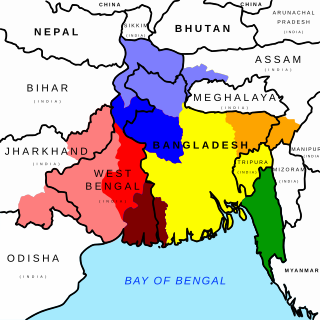
Bengali music comprises a long tradition of religious and secular song-writing over a period of almost a millennium. Composed with lyrics in the Bengali language, Bengali music spans a wide variety of styles.

Salil Chowdhury was an Indian music director, songwriter, lyricist, writer and poet who predominantly composed for Bengali, Hindi and Malayalam films. He composed music for films in 13 languages. This includes over 75 Hindi films, 41 Bengali films, 27 Malayalam films, and a few Marathi, Tamil, Telugu, Kannada, Gujarati, Odia and Assamese films. His musical ability was widely recognised and acknowledged in the Indian film industry. He was an accomplished composer and arranger who was proficient in several musical instruments, including flute, the piano, and the esraj. He was also widely acclaimed and admired for his inspirational and original poetry in Bengali.

Jibon Theke Neya is a critically acclaimed Bengali-language East-Pakistani film directed by Zahir Raihan. Released in 1970, described as an example of "national cinema", using discrete local traditions to build a representation of the Bangladeshi national identity
Neeta Sen was an Indian classical music director and singer.
Shibram Chakraborty (1903–1980) was a popular Bengali writer and humorist who is best known for his humorous stories. His best known short stories and novels are renowned for their unique use of pun, alliteration, play of words and ironic humour. He was a prolific author who also wrote poems, plays, non-fiction and novels for mature audiences in his long career.

Zulfiqer Russell is a Bangladeshi lyricist and journalist. He is currently the editor of the online news site, The Bangla Tribune. He won the Bangladesh National Film Award for Best Lyrics for the film Putro (2018). He was the winner of the Channel i Music Awards in 2008, 2010, 2013 and 2022 and also received the Mirchi Music Awards (Bangla) award for the Song of the Year in the Modern Song category for, "Shabuj Chilo". On 2020 he was awarded CJFB Performance Award 2019 as best lyricist. He had also worked with renowned Indian singers and composers including Grammy and Academy Award (Oscar) winner musician A. R. Rahman. He wrote the official theme song 'Ektai Achhe Desh' of the Golden Jubilee of Bangladesh Independence sang by fifty renowned singers of Bangladesh.
Gauriprasanna Majumdar (1925–1986) was an Indian lyricist and writer, known for his work in Indian cinema and Bangladeshi Cinema. He is most commonly associated with the black and white era of Bengali cinema, when he penned several enduring classics for films. He won the Bengal Film Journalists' Association Awards for best lyricist for Swaralipi (1962), Palatak (1964), Anthony Firingee (1968), Bon Palashir Padabali (1974), Sanyasi Raja (1976) and Anurager Chhoan. He also won National Film Awards of Bangladesh for Sesh Porjonto (1969).

Sudhin Dasgupta was a prolific Bengali music director, lyricist, and singer. He worked in various other Indian languages, such as Hindi, Assamese and Oriya. His contribution opened a new horizon to the Bengali music for both the arenas of Bengali basic song as well as Bengali film song.
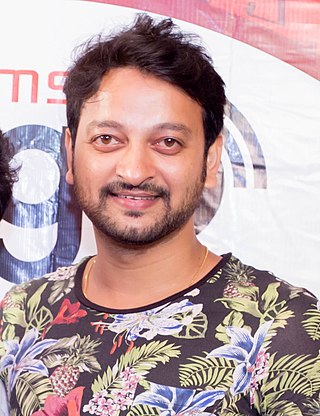
Symon Sadik is a Bangladeshi film actor, assistant director, lyricist, model and politician. His films are predominantly in Dhallywood cinema. He is the current Assistant General Secretary of the Bangladesh Film Artists' Association. He made his debut as a lead in the Bangladeshi film Ji Hujur (2012). And he won Bioscope Borsho-sera awards for Best acting in Poramon (2013). He also won Bangladesh National Film Award for Best Actor for his role in the film Jannat (2018).
Antony Firingee is a 1967 Indian biographical musical drama film directed by Sunil Bannerjee, starring Uttam Kumar and Tanuja on lead. It is a biopic based on the life of Anthony Firingee, a Bengali language folk poet of Portuguese origin. Antony Firingee was a Portuguese-Indian who became a famous Bengali poet musician and fell in love with Nirupoma. She agreed to marry him after revealing her tragic history. But his fame was not enough to overcome their ostracisation and tragedy struck again.
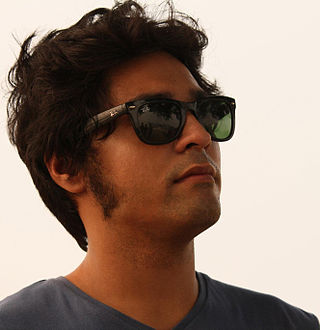
Gourab Chatterjee is an Indian film and television actor based in Kolkata. He is the grandson of Uttam Kumar.

Minar Rahman, popularly known as Minar, is an independent Bangladeshi singer-songwriter, composer, lyricist, writer and cartoonist. He rose to fame with the first released song "Shada Ronger Shopnogulo", which was a hit in 2008. Minar does write lyrics and compose songs from his childhood and has developed his own musical style. He has released his first solo album in 2008 named 'Danpitey' which is written, composed and sung by himself. He published his first novel 'Rudro Ebong Ekti Grand Piano' in Ekushey Boimela 2019.
Nirmalendu Chowdhury was a Bengali musician, composer, lyricist and singer, who contributed significantly to the folk music of Eastern India, particularly of Bengal and Assam.

Bijoy TV is a Bangladeshi Bengali-language privately owned satellite and cable television channel based in Banglamotor, Dhaka. This channel was established by former mayor of Chittagong A. B. M. Mohiuddin Chowdhury. Current Deputy Minister of Education Mohibul Hasan Chowdhury is one of the shareholders and is the former managing director of Bijoy TV.

"Shudhijon Shono" is a song by Bengali rock band Moheener Ghoraguli, featured on their 1978 debut album, Ajaana UDonto bostu ba Aw-Oo-Baw. Written by Ranjon Ghoshal, composed by Gautam Chattopadhyay, and sung by Tapesh Bandyopadhyay, Tapas Das and Ranjon. The lyrics is a call to the people of the city, while bass guitar carry the music. It was one of the band's initial songs such as "Haay, Bhalobasi" and "Bheshe Ashey Kolkata".
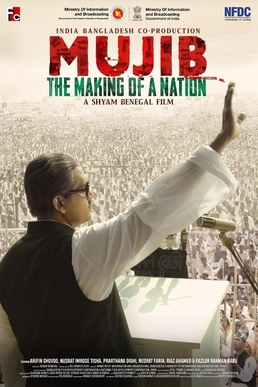
Mujib: The Making of a Nation is an upcoming Indian-Bangladeshi co-produced biographical film directed by Shyam Benegal. It stars Arifin Shuvoo as Sheikh Mujibur Rahman, the first president of Bangladesh and father of the nation, popularly known as Bangabandhu, who was assassinated with his family during coup d'état in 1975. This is the first government produced biopic about him.

Sarbojaya is an 2021 Indian Bengali Language Drama television series which is premiered on 9 August 2021 on Bengali general entertainment channel Zee Bangla and it's also available on ZEE5 before it's telecast. The show is produced by Snehasish Chakraborty of Blues Productions and stars Debasree Roy, Kushal Chakraborty and Sanghamitra Talukdar. This show marked the comeback of Debashree Roy in the television industry after 25 years. The show went off air on 14 May 2022 due to low viewership and was replaced by Khelna Bari.
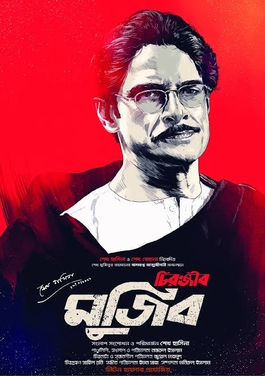
Chironjeeb Mujib is an 2021 Bangladeshi Bengali-language biographical film directed by Nazrul Islam who is script writer of Prime minister of Bangladesh. It stars Ahmed Rubel as Bangabandhu, the first President of Bangladesh and Father of the Nation. The film is based on a portion of The Unfinished Memoirs, written by Bangabandhu, which states his life from 1949 to 1952.

"Jodi Raat Pohale Shona Jeto" is a song from the 1991 Bangladeshi music album named Jonotar Nouka. The lyricist of this modern music was Hasan Motiur Rahman. Moloy Kumar Ganguly composed sang originally this song to the tune with music arrangement of Almas Ali. The song is considered to be the most popular song about Sheikh Mujibur Rahman. The song was released under label of Chenasur along with other songs from the audio album.

The Mausoleum of Bangabandhu Sheikh Mujibur Rahman is the mausoleum of Sheikh Mujibur Rahman, the founder and the first president of the People's Republic of Bangladesh. It is located in Tungipara of Gopalganj district, the birthplace of Mujib, and was designed by architects Ehsan Khan, Ishtiaque Jahir and Iqbal Habib.















